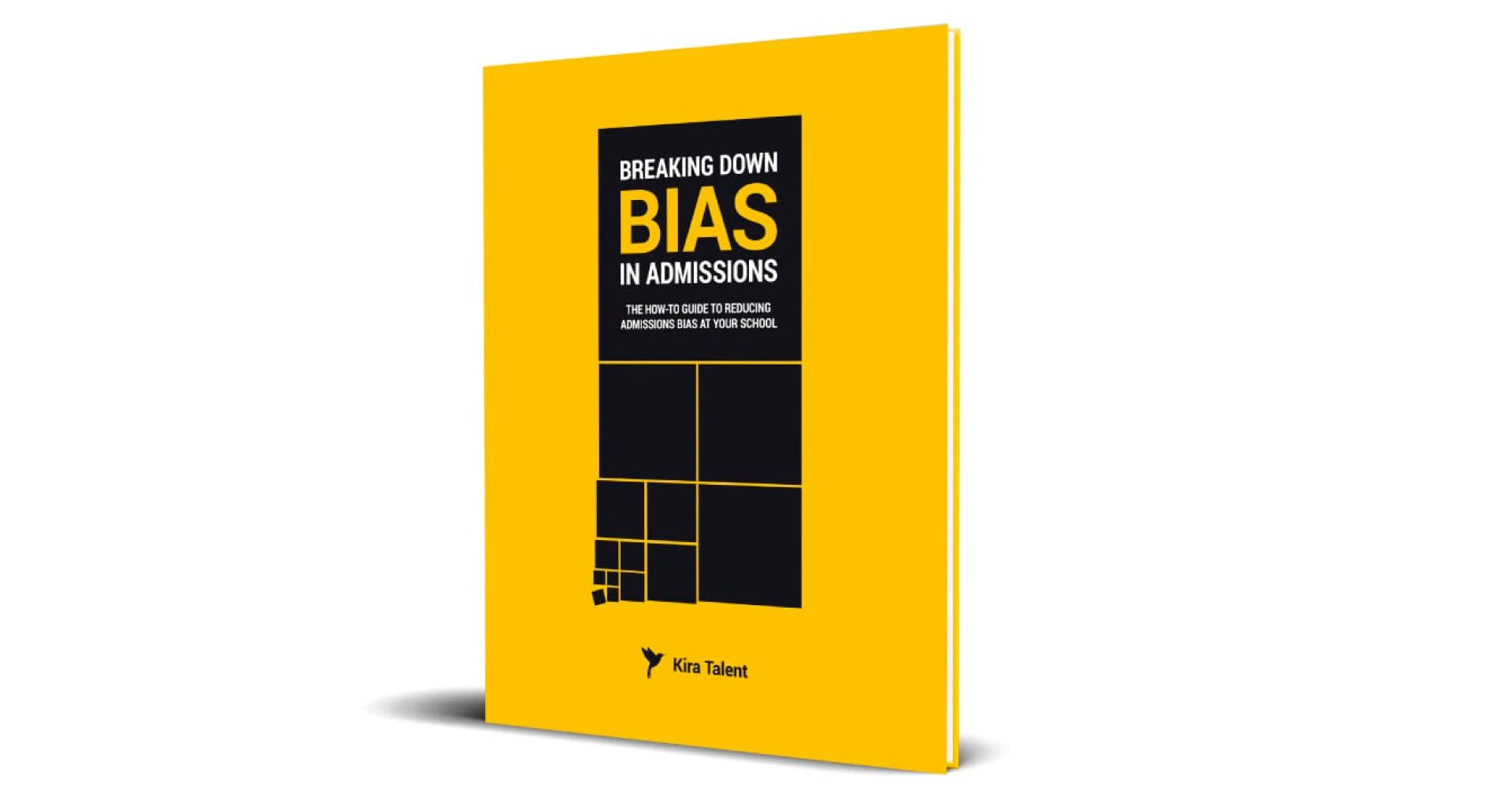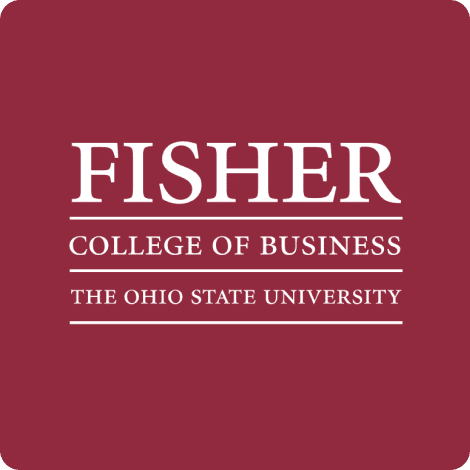Critics are questioning the "value of an MBA," tuition rates are climbing rapidly, and bootcamp style-learning is ballooning in popularity, leaving traditional business schools to be both creative and strategic in their efforts to yield exceptional classes.
It's not an easy task, but there are some schools continuing to see growth as they effectively articulate the value of their programs.
One of these schools is the Yale School of Management (SOM).
Yale SOM's MBA yield rate is 48 percent and their acceptance rate is 19 percent for the Class of 2018, compared to a yield rate of 46 percent and selectivity of 21 percent for the Class of 2017. Their class size is also growing, as an increase in top-tier applicants has challenged the school to find ways to accommodate more top candidates.
To understand more about the school's recent success, we are delighted to have Melissa Fogerty, Director of MBA Admissions, share how the school approaches yield management and the compelling ways the team communicates the value of their program to applicants.
Melissa joins us in a Q&A below:
First, Meet Melissa:
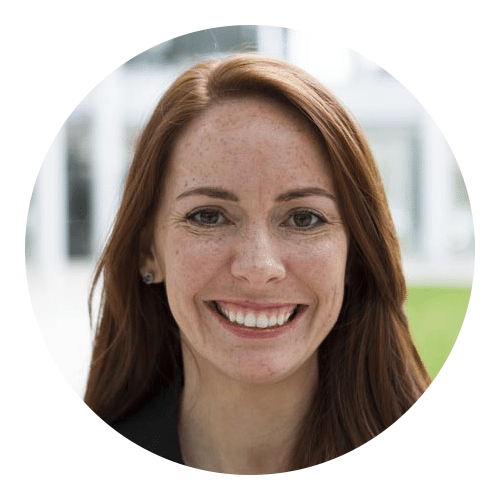
Melissa Fogerty
Director, MBA Admissions
Yale School of Management
As Director of MBA Admissions at the Yale SOM, Melissa Fogerty has no shortage of high expectations and aggressive enrollment targets to meet. Melissa joined the team at Yale in New Haven, Connecticut in 2010, after practicing as a corporate attorney for several years in Chicago and New York. Now, she works to bring in a talented, global, and diverse group of MBA candidates to the School of Management each year.
Melissa is a passionate traveler. She loves that her work allows her the opportunity to travel the world, meet interesting and accomplished individuals, then have the reward of watching them graduate a few short years later. When she's off the clock she's certainly not off the road, you can find her packing for the beach or road tripping across the U.S. with her family.
Now that we know a bit more about Melissa, let's talk yield management.
Molly McCracken: Thanks for joining us to talk about Yield Management. Can you give us a high-level overview of how Yale MBA approaches and prioritizes yield management?
Melissa Fogerty: First, I’ll define yield. Yield is an admissions term referring to the percentage of applicants who accept our admissions offer. A higher yield indicates that applicants who are admitted to a program are more likely to accept their offers, which sometimes indicates a more competitive program (though not necessarily).
At Yale SOM, our prospective students are generally applying to more than one program and comparing a few compelling offers when it comes time to make a decision – often some of those offers aren’t even MBA programs, but rather work promotions or other career opportunities. We are competing against peer institutions for the best and brightest students, but also the job market at large.
All schools are aware of yield rates, and it impacts their operations to varying degrees. At Yale SOM, our approach is not to play a “yield game” – we’re not making admissions decisions based on who we think is likely to accept our offer at the time of application.
Rather, we admit the most talented students and spend a lot of time throughout the admissions cycle educating this group about what our program has to offer. Our community members – students, alumni, and faculty – play a key role in this process. I believe that the more interactions a prospective student can have with our community, the better sense they’ll have of our program and whether it’s a great fit.
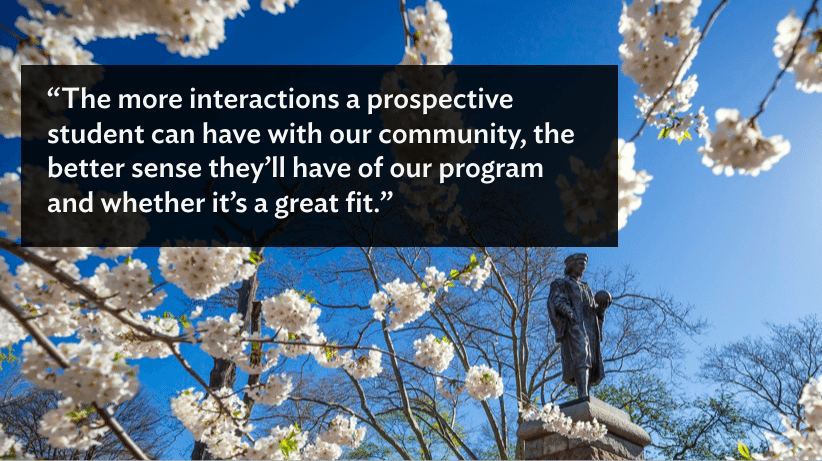
Molly: “Yield” is a pain point for schools across the board. When your team sits down to talk about yield management, what are the key questions and goals you keep in mind throughout an admissions season and when reviewing candidates?
Melissa: I wouldn’t call yield a pain point. It’s a reality of admissions, but the ultimate goal isn’t yield itself – it’s to bring in a fantastic class. If we admit a prospective student, it’s because we really want them to accept our offer. We know that they’ll have many attractive options, but we’re confident about what we’re offering and hope we’ll see them the following August at Orientation.
I think prospective students often worry about demonstrating interest in a program, thinking that we have a checkbox on our review form for students who have come for a campus visit, attended a reception, or otherwise had contact with admissions staff members. All of those things are important in a prospective student’s research process, so I don’t want to de-emphasize them for that purpose. However, they don’t have bearing in our admissions decision. We know that traveling to New Haven prior to applying might not be feasible for an applicant, for example, so we wouldn’t hold this against them in our application review. Other schools might look for interactions like this as evidence of potential yield, but we don’t take this approach.
To quote my favorite musical, Hamilton, “When you got skin in the game, you stay in the game. But you don’t get a win unless you play in the game.” – our approach is to admit the people we really want in the program, even if yield seems like a long shot on the decision date. There’s plenty of time before the enrollment deadline to show them why our program should be their top choice for an MBA.
Molly: What would you say are the biggest factors for applicants when they choose where to enroll?
Melissa: That’s a great question. I would ask applicants to think about the question this way – in a year or two, when you’re sitting in front of a recruiter for a post-MBA job and asked why you chose your MBA program, what are you going to say? You should have an excellent response to this question for your chosen program. Looking at Yale SOM, you should be able to point to some of the incredible ways you engaged with the greater Yale University (e.g., Yale Entrepreneurial Institute, Yale Healthcare Conference, a joint degree with another Yale graduate program like the Yale School of Forestry and Environmental Studies), the global perspective you bring to their organization, and unique academic experiences you’ve had through our integrated curriculum (e.g., advising real companies like Google and P&G on marketing issues through YCCI, sitting on a New Haven nonprofit board, working in a global virtual team with classmates at HEC and EGADE). Your answer to this question will help you to define the MBA program factors that are most important to you.
Molly: What tactics has your team employed to help applicants make Yale their top choice MBA and enroll at the School of Management?
Melissa: The focus is really on facilitating as many interactions with our community as we can, and making those interactions meaningful for prospective students. We connect our admits with alumni with similar career paths and with current students who share their professional and extracurricular interests. We also include our brilliant faculty in the discussion, and give prospective students a sense for what their academic and professional opportunities will be like at Yale. Admissions staff members and alumni connect with admitted students all over the world- hosting receptions in India, China, Latin America, Europe, and elsewhere. We host two Welcome Weekends at Evans Hall and provide stipends for our admits to assist with the expense of traveling to campus to attend.
We also leverage technology to host many online events, including career webinars with our Career Development staff, events for women in management, students of color, and international students, and joint degree panels. This year we’re rolling out a series of webinars that will feature faculty members describing their subject area faculty groups (called “departments” at other programs), which will highlight the faculty team members, core courses and electives offered, faculty research, and ways students interact with faculty.
Molly: Yale SOM has had a tremendously successful past few years -- becoming more selective, increasing applicant volume, improving yield, average GMAT scores, just to name a few things, What are the top three things you would recommend to other schools looking to improve the quality of their classes?
Melissa: Thank you! I work with an incredible team in the SOM admissions office and all of them are committed to what we do. The top three things I would suggest are:
- Listen to your students. We survey our populations regularly – incoming students, students who decline our offer of admission, alumni, etc. We’re eager to learn from them about their application and admission experiences both at SOM and at other schools they considered, and modify our practices accordingly.
- Get the whole community involved. It’s one thing for an admissions officer to tell a prospective student about how accessible faculty and alumni are, and quite another to feature these notable speakers at a prospective student event. We aim to show, not tell, the strong SOM community, and our “admissions team” reaches far beyond those who officially work in the SOM admissions office.
- Try new things. In our office, we’re constantly piloting new ideas. Some work and some don’t, but we’re never static. Bruce [DelMonico, Dean of Admissions at Yale SOM] and I attended a really interesting session on ideation at the most recent GMAC annual conference, and decided to bring those techniques back to our office for a staff session next week. We’ll be ideating on this question: with unlimited resources, what changes would you make to our office’s operations? For the format, we’ll give everyone in our office a post-it pad and sharpie and cover the walls of our conference room with ideas – from practical to far out. We think this will be a great opportunity for everyone on our team to take a step back and think of some creative new things to try.
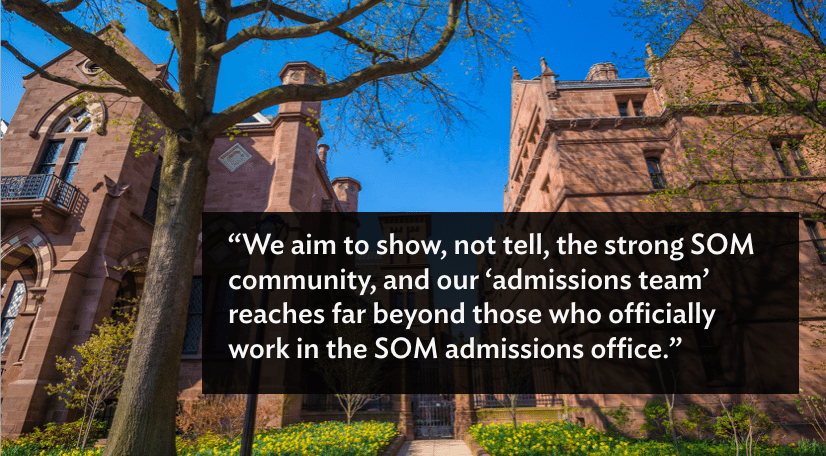
Molly: I'm throwing in a bonus question here. What is one thing you’d like to change about the admissions process?
Melissa: I’d like for there to be less misleading anonymous chatter about the MBA admissions process on online chatboards. So much of what you read on these boards is inaccurate. I often see someone publishing “Here are Yale SOM’s interview questions!” (Where did you come up with that list? And no.), “Yale is calling all admits on the West Coast now!” (No.), or “All of Yale’s interview invites are going out today!” (No, again.).
Our admissions team is very open and candid about answering questions, and ideally prospective students would ask us their questions instead of anonymous online sources so that they would get the best information.


